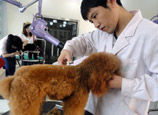
DES MOINES, United States, May 4 (Xinhua) -- Creating a more active private retirement system would work to China's best benefit both economically and socially, head of the Principal Financial Group said Friday.
It is likely for China to have a meaningful retirement reform in the near future, Larry Zimpleman told Xinhua in an interview.
A robust retirement system can create better long-term growth for China's economy by allowing for more opportunities in infrastructure development and capital market growth, Zimpleman said, adding that it is of more importance now as China's growth rate is moving down.
"We need greater long-term sources of capital that can be put into the market place and invested for 10, 15, 20, 25, 30 years," he said.
"It is the case we saw in the United States in the 1990s," when the country witnessed the highest economic growth since World War II, Zimpleman said.
Retirement contributions are the long-term capital that fuels economic growth, Zimpleman explained.
"When you look at where the net increase in capital came from in the 1990s, it was all attributable to the growth in 401(k) plans," he said, referring to a defined contribution pension plan in the United States.
Today U.S. retirement market assets have reached nearly 18 trillion U.S. dollars, which represents approximately 80 percent of total U.S. economy, one of the highest asset to economy ratios in the world.
In Zimpleman's opinion, having a private retirement system is important in moving China from an economy driven by exports to one sustained by internal demand. Such a system would also take care of one of the priorities of urbanization and balanced development of China's rural and urban areas.
Given the aging of its population, China needs a more robust and active pension system for retirement security, especially the defined contribution one, because the defined benefit systems are often difficult to manage the cost in a long term and create unsustainable financial obligations on many employers regardless of size, he said.

















 Brazilian self-defense martial art gains popularity in Beijing
Brazilian self-defense martial art gains popularity in Beijing


![]()
